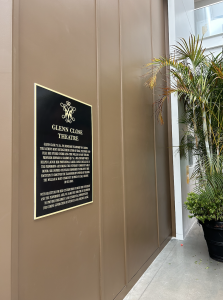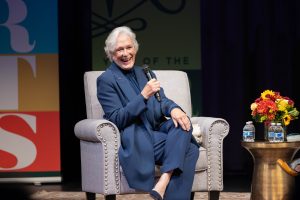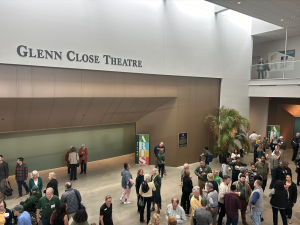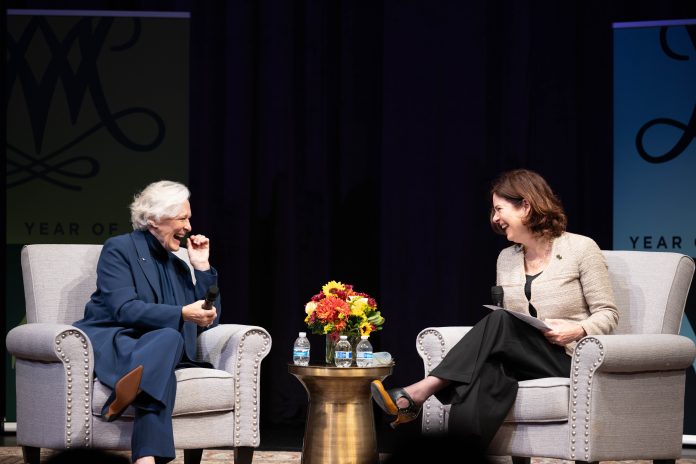Content Warning: This article contains mentions of suicide and self-harm.
The following article was previously published on The Flat Hat’s website during the week of Oct. 23. However, due to an unforeseen technological glitch, it was removed from the website for a period of time and was re-uploaded today, Nov. 6.
Saturday, Oct. 21, the College of William and Mary hosted a Presidential Conversation between College President Katherine Rowe and Glenn Close ’74 as part of the College’s Homecoming and Reunion Weekend festivities. Close is an eight-time Oscar nominee and a winner of three Golden Globe awards, three Emmy awards and three Tony awards. The conversation took place in Phi Beta Kappa Memorial Hall’s newly inaugurated Glenn Close Theatre.
Rowe introduced Close, highlighting her many accolades and honors. In addition to her bachelor’s degree in theater and anthropology, Close received an honorary degree from the College in 1989 and an honorary fellowship in 2019. She is the third person in the College’s history to be honored with the fellowship, which only universities with a Royal Charter can award.
After a standing ovation from audience members, Close sat down with her dog, Sir Pippin of Beanfield. Rowe began their conversation by discussing Close’s time at the College and the 2023 Year of the Arts. Along with serving as the Grand Marshal in the Homecoming Parade, Close also taught an acting masterclass and visited the McLeod Tyler Wellness Center during her visit.

“I spent some wonderful time at the Wellness Center, which I was deeply impressed by, and spent an hour or more with their Wellness Ambassadors,” Close said. “It was really great. It was very moving.”
Close then discussed her work as the founder of Bring Change to Mind, an organization that battles the stigma surrounding mental illness. BC2M was founded in 2009 and was motivated by Close’s family history with mental illness. BC2M now supports over 500 high school clubs focused on mental health advocacy across the nation.
Rowe also mentioned that while the COVID-19 pandemic impacted the mental wellness of people worldwide, she believes the stigma behind mental illness has decreased substantially due to an increased culture of support.
“The story of mental health on campus is the story of great success nationally,” Rowe said. “That really gives me hope for society, those efforts among young people, young adults. We see it here with our Wellness Ambassadors; they have the most authority with their peers and they use it.”
After discussion about BC2M, Rowe transitioned to the College’s Year of the Arts and the transformative power that the College had on Close’s career. Close highlighted the influence of former College professor Howard Scammon, who passed away in 1999.
“There is nothing more beguiling and affirming than a student that takes the work seriously,” Close said. “We chose each other, I think.”
Scammon understood how serious Close was about becoming an actress and guided her through the rest of her college career. When she scored her first role on Broadway just five months after graduating, Scammon attended Close’s performance. He continued to attend her performances in various roles and even offered her notes after each one.
Rowe mentioned that Close’s majors in both anthropology and theater showcased the value of the College’s ampersand, which highlights the dynamic nature of the College’s students. Close believes that her background in anthropology helped her delve deeper into her characters.
“Theater is language, and I learned about the beginning of language. Theater is about behavior, and you learn about primitive societies, you learn the evolution of behavior, and of community. Theater is community. You learn about how humans have dealt with each other and with other communities,” Close said.
Close mentioned the importance of a liberal arts education in cultivating humanity.
“I think a part of a great liberal arts education is to learn how to express yourself as an individual,” Close said. “The arts is where you explore the human condition, and I think the more you can do that, the more you will have empathy for what it means to be human.”
When discussing Close’s involvement in the College’s theater department, Rowe asked about her first production, Shakespeare’s “Twelfth Night,” in which Close played the role of Olivia. She reminisced on the joy of being in that production.
“I do remember the thrill of finally doing what I wanted to do,” Close said.
She also reflected on playing Hecuba in “The Trojan Women” by Euripides. Close shared that the monologue she delivered in the play has stayed with her in the way that it is still relevant today.
“She has that amazing speech over the body of her dead grandson who has been killed in war and is brought back on the shield of his father,” Close said. “I mean, think of what’s going on in the world now and read that speech. It goes to the essence of the cruelty and the insanity of war.”
Close further discussed her approach to characters.
“I feel you can’t do justice to a character if you judge them because that will separate you from them,” Close said. “You have to ultimately love them. And the way to love them is to find where your common humanity is.”
The next step in her process is working with the director to express the character’s stories. Close talked about disagreements with directors and how an actor must be unselfish to play a character truthfully.

ALFRED HERCZEG / WILLIAM AND MARY NEWS“Your job is to be fiercely subjective about your character,” Close said. “It’s about what is right for that character, for that moment, for that piece. You have to suspend your ego, really.”
Rowe’s last question to Close asked about why people should consider attending the College. Close mentioned the impact of professors, the beauty of the campus and how important the community was to her.
“It’s an incredibly beautiful campus, I’m astounded by the way it’s changed,” Close said. “You get a first-class education, but you get faculty and a community that is connected to the needs of the students.”
Rowe then transitioned the conversation to a question-and-answer segment with previously submitted questions from faculty, students and alumni.
The first question asked about what Close learned at the College that she has taken with her throughout her life and career. Close answered that her time at the College became the origin of her career.
“My adult life, my life as an actor, my life as an artist started here. So I’ve taken everything with me,” Close said.
Another question asked Close how technology and streaming platforms are impacting actors. Close asserted that it is already having an impact by being the cause of the SAG-AFTRA strikes.
Close recounted a recent movie she filmed where photos were taken of her making different expressions with 360-degree cameras so that they could manipulate her face using AI. Although the producers would not be able to use it without her permission, she found their possession of her facial information concerning, as this technology could change the entertainment industry.

“It’s a revolution that is ongoing for sure, and I don’t know if we know yet the great impact it will have on my profession,” Close said.
One question asked about advice for students involved in the arts at the College. Close emphasized believing in oneself and the importance of honing a craft.
“I always come back down to the craft. Learn your craft, and put in the hours to become excellent,” Close said.
Close also discussed some actors that she is inspired by, citing Katharine Hepburn as her greatest acting inspiration and whom she watched on the Dick Cavett Show while a student at the College.
“I was a senior, and it was such an amazing interview, and I’ve always had a huge respect for her, and that night I knew what I wanted to do,” Close said. “That night I said to myself, like Howard, ‘You want to do that? Then do it.’”
The audience also asked Close about her friendship with comedian and actor Robin Williams, who passed away by suicide in 2014 after battling Lewy body dementia. Close mentioned that BC2M gives out the Robin Williams Legacy of Laughter award every year, most recently awarded to actor Ryan Reynolds, and reflected on her love for Williams.
“He was brilliant,” Close said. “I saw Robin at his performance at the Metropolitan Opera House…he held that audience for two and a half hours. He was a genius, but very childlike. You know, he wasn’t on all the time, in fact, a lot of my compatriots are basically introverts.”
The last audience question focused on Close’s life as a working single mother. Close expressed that she was blessed as a single mother to have the resources to both keep working and care for her child.
“I think you’re cut in half as soon as you have a child, no matter what because you always, you know, half of you is with that child. I still think, my daughter is 35, that she’s only safe when I’m there,” Close said.
To end the conversation, Rowe introduced a lightning round of questions, asking about Close’s favorite book, College production and more. Close reflected on the importance of her dog, Pip, in helping her get through the stress and homesickness of her job.
“He takes you out of yourself,” Close said. “It’s funny, when we’re on a movie set, he does the same thing for everybody. They gave him a chair in one of my last movies and it said ‘emotional support producer.”
Grace Jaye, a prospective student at the College who recently applied early decision, discussed her thoughts on the conversation between Rowe and Close. Jaye was impressed with how Close kept her audience engaged.
“I haven’t seen a lot of her movies, only ‘101 Dalmatians’, but I was just stunned by how she approached each topic so well, and all of her answers were so deep, they were so complex, she didn’t only touch on the answer, but she added layers,” Jaye said
Rowe also reflected on the conversation in a comment to The Flat Hat.
“What I thought was so generous about Ms. Close was the way that she opened up on her evolution as a professional, as a parent, as a working parent, as a single parent, as a student,” Rowe said. “I loved the way she conjured all her faculty and those relationships in this space that meant a lot. This was her playhouse, and it’s going to be her playhouse for generations of students to come.”

